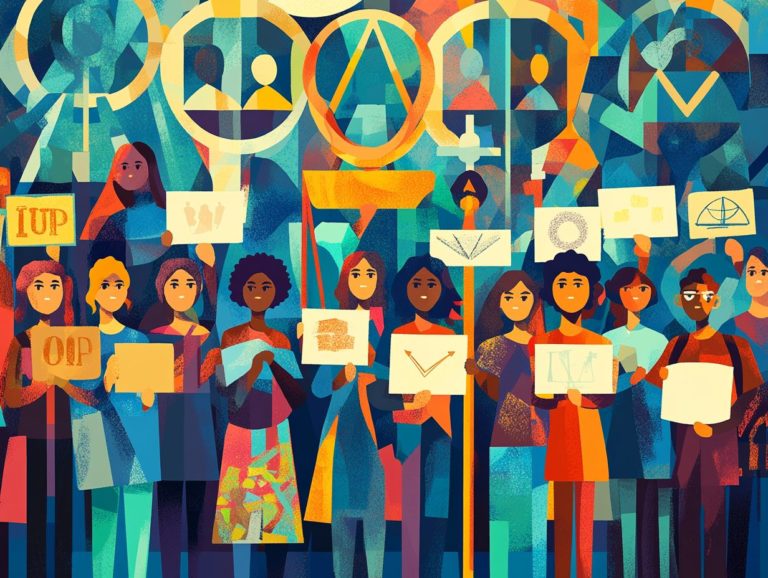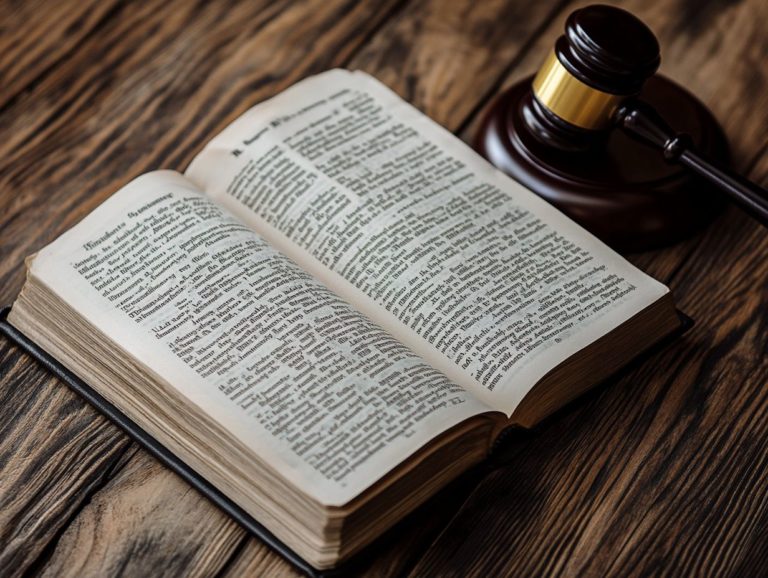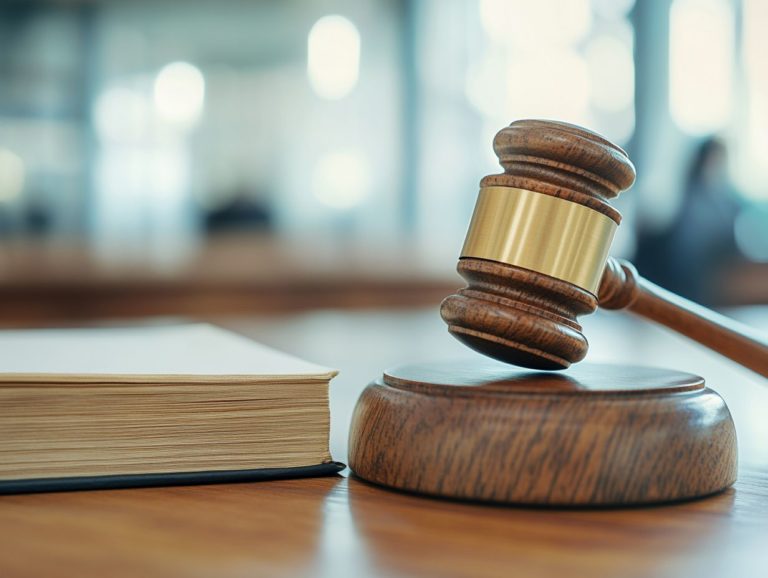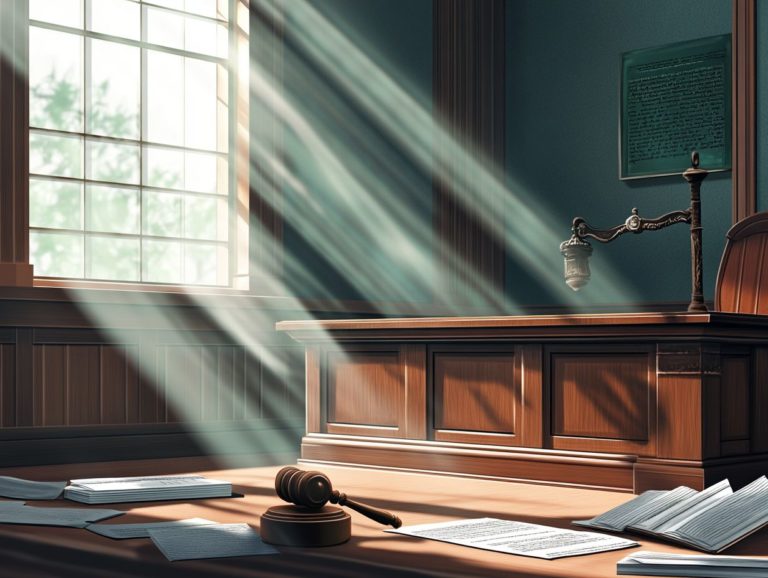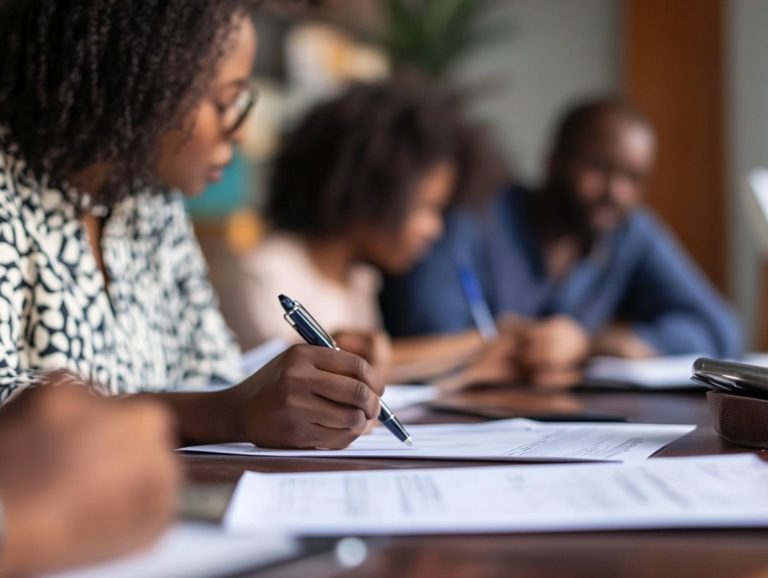Rights of the Accused: A Comprehensive Guide
In a justice system grounded in fairness and equality, it s crucial for you to grasp the rights of the accused. This guide offers an overview of these rights, emphasizing key elements like your right to a fair trial, access to legal representation, and the protections afforded during arrest and trial processes.
It delves into foundational concepts such as the presumption of innocence and your right to appeal. This ensures you have a clear understanding of each right and its significance within the legal landscape.
Explore these vital protections with us, as they play a pivotal role in upholding the integrity of our justice system.
Contents
- Key Takeaways:
- Understanding the Rights of the Accused
- The Right to a Fair Trial
- Rights During the Arrest Process
- Rights During the Trial Process
- Rights During Sentencing
- Frequently Asked Questions
- What is the right to remain silent?
- Can an accused person have a lawyer?
- What is the right to a speedy trial?
- What happens if the accused’s rights are violated?
Key Takeaways:
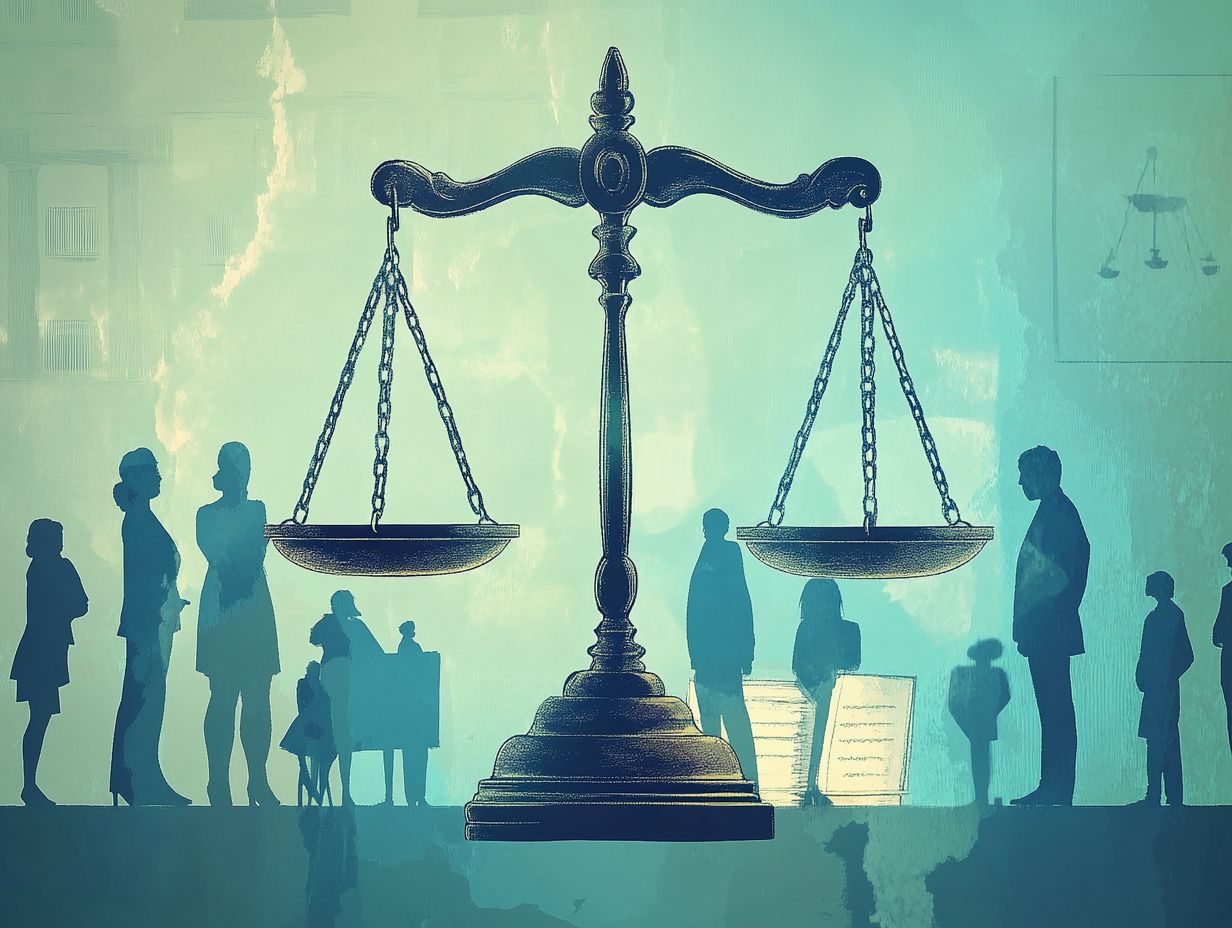
The rights of the accused include:
- A fair trial.
- Legal representation.
- Protection from self-incrimination.
- Right to remain silent during arrest.
Understanding the Rights of the Accused
Understanding the rights of the accused is essential for preserving a fair legal system. These rights protect individuals from potential abuses.
They guarantee due process throughout criminal proceedings. The rights of accused persons are firmly established in various amendments, notably the Sixth and Fourteenth Amendments, and have been significantly influenced by landmark cases like Gideon v. Wainwright and Powell v. Alabama.
These vital legal protections encompass the right to legal representation, a presumption of innocence, and safeguards against self-incrimination. This means you don t have to say anything that might make you look guilty.
Every individual facing charges has a fair chance to defend themselves. These rights are not just legal jargon; they empower you to stand up for yourself when facing serious charges. Knowing them is your first step toward justice!
What are the Rights of the Accused?
The rights of the accused encompass a range of legal protections designed to ensure fairness throughout the criminal process. These essential rights include your fundamental right to an attorney, ensuring you have access to competent legal representation.
Without effective counsel, navigating the intricate legal landscape can feel overwhelming and may lead to unfavorable outcomes. The right to a fair trial guarantees that judgments are based on evidence presented transparently, protecting you against biases and unfair treatment.
Protection against unreasonable searches is vital. It helps maintain personal privacy and the integrity of the judicial system. Together, these legal provisions form the backbone of a robust criminal defense, giving you the power to contest charges while upholding your dignity and rights.
The Right to a Fair Trial
The right to a fair trial stands as a cornerstone of the criminal justice system, guaranteeing that every accused individual receives a just process wherein their case is evaluated impartially by a jury.
This right includes several essential components:
- The presumption of innocence until proven guilty.
- The right to a speedy trial to avert unnecessary delays.
- The right to a public trial that fosters transparency in legal proceedings.
Together, these elements uphold the integrity of the justice system and safeguard individuals against arbitrary actions by the state.
Presumption of Innocence
The presumption of innocence stands as a cornerstone of the legal rights granted to individuals facing criminal charges. It ensures that you are considered innocent until proven guilty.
This fundamental principle not only protects you from wrongful convictions but also upholds the integrity of the justice system as a whole.
In the context of a fair trial, the burden lies with the prosecution to present compelling evidence that substantiates their claims beyond a reasonable doubt. This high standard of proof prioritizes justice and significantly reduces the risk of errors that could irreparably harm innocent lives.
Moreover, it cultivates public confidence in the legal system. Society acknowledges that every accused individual deserves a fair assessment of their case, devoid of bias or presumption.
Right to Legal Representation
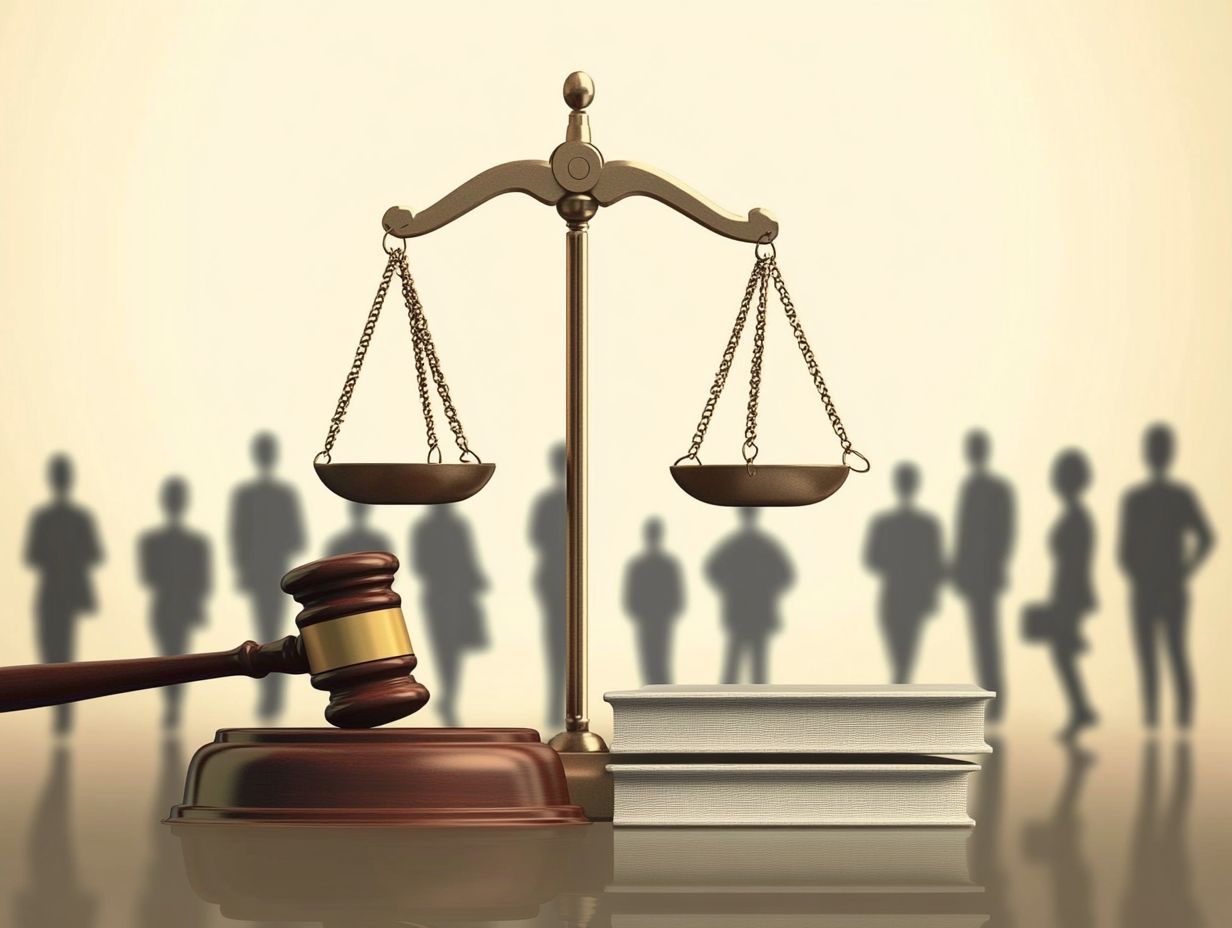
The right to legal representation is a cornerstone of a fair trial. It ensures that you, as an accused individual, have access to a defense attorney who can provide effective counsel throughout the criminal proceedings.
This principle upholds justice. It guarantees that even if you cannot afford an attorney, a qualified professional will advocate for you.
Landmark cases like Gideon v. Wainwright highlight the necessity of this right. They show how the absence of representation can lead to unfair legal results.
Defense attorneys are not just guides; they protect your rights and personal dignity. They stand against the might of the state, giving you a fighting chance in the complex criminal justice system.
Rights During the Arrest Process
Understanding your rights during an arrest is vital. This knowledge safeguards you against potential law enforcement abuses.
Your Miranda rights inform you of your right to remain silent and to seek legal counsel. This knowledge gives you power to navigate the criminal justice system with confidence.
Miranda Rights
Miranda rights are key during an arrest. They ensure you know your rights against self-incrimination and your right to legal representation.
These rights act as a protective barrier against pressuring questioning methods. They empower you to make informed decisions about communicating with law enforcement.
By ensuring everyone knows their protections, Miranda rights enhance the integrity of the criminal justice system. You can invoke these rights to remain silent or request an attorney, significantly influencing your case’s outcome.
If these rights are violated, critical evidence may be excluded from court. This highlights their crucial role in upholding fair legal proceedings.
Search and Seizure Rights
Your search and seizure rights, safeguarded by the Fourth Amendment, protect you against unreasonable searches. They ensure that any evidence gathered during an arrest meets legal standards.
These rights are essential for upholding civil liberties. They foster trust in the legal system by preventing arbitrary invasions of your personal privacy.
When these protections are honored, they empower you and uphold the integrity of criminal investigations. Evidence collected during searches must be obtained lawfully to lay the groundwork for fair trials.
This protects the rights of the accused and holds law enforcement accountable for their responsibilities.
Rights During the Trial Process
Your rights during the trial process are designed to uphold justice. They ensure you receive a fair hearing.
This includes your rights to a speedy trial and to confront witnesses testifying against you. These legal protections are vital for maintaining trial integrity and allow you to challenge evidence and present your own witnesses.
Right to a Speedy Trial
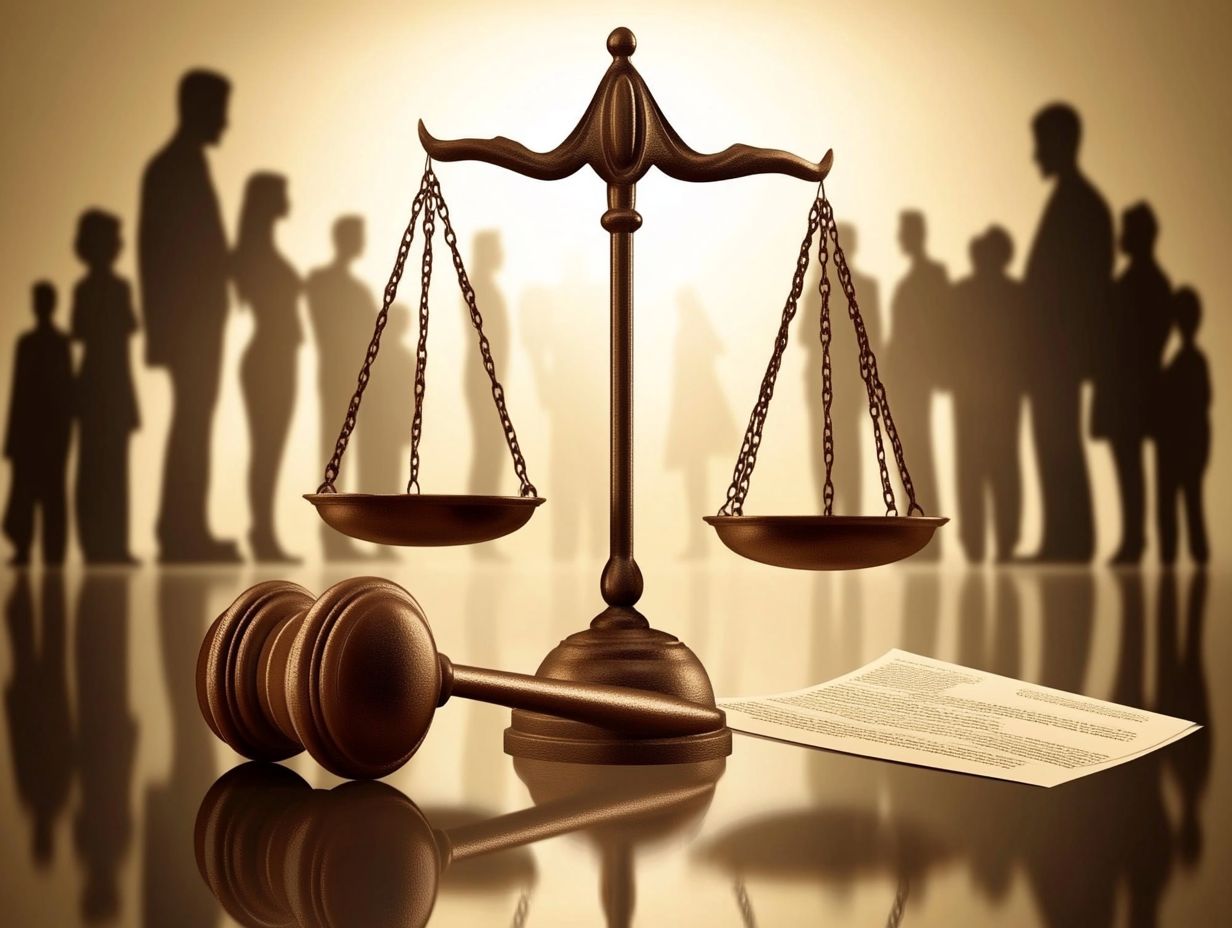
The right to a speedy trial is a cornerstone of legal protection. This principle helps reduce the emotional and psychological burden on the accused.
It also ensures that the evidence remains fresh and credible, which is essential for a robust defense.
Timely legal proceedings bolster the integrity of the justice system, reinforcing public confidence and accountability. It highlights the need to balance the interests of both the accused and society, enabling resolutions that respect individual rights while upholding the rule of law.
This right helps reduce the risks of long delays, which can lead to miscarriages of justice and compromise the very ideals of fairness and equality.
Right to Confront Witnesses
The right to confront witnesses is a vital element of trial fairness. It grants you the opportunity to cross-examine accusers and challenge the testimony presented against you.
This fundamental right ensures that your legal representation can engage directly with those providing evidence, meticulously scrutinizing the credibility and reliability of their statements.
By giving you the power to question witnesses, the justice system reinforces transparency and fosters an equitable legal process.
This ability to confront can often unveil inconsistencies or biases in testimony that might influence the trial’s outcome. Ultimately, it’s through this essential mechanism that the integrity of the judicial system is preserved, facilitating a more balanced approach to justice for everyone involved.
Rights During Sentencing
Rights during sentencing are crucial for ensuring that you are treated justly and equitably within the criminal justice system. This encompasses your right to appeal and your right to due process, both of which are fundamental to safeguarding your interests.
Right to Appeal
The right to appeal is not just a privilege; it’s your chance to challenge unfair decisions! It enables you to contest the outcomes of your trials and seek a review of your case in higher courts.
This essential aspect of the criminal justice system gives you the power to contest potentially unjust verdicts and plays a critical role in upholding the principles of due process.
By offering a pathway for court review, the right to appeal acts as a vital safeguard against judicial errors that could result in wrongful convictions or excessively harsh sentences.
This ability to appeal ensures that everyone, regardless of their circumstances, has the opportunity to correct any potential mistakes made during trial proceedings. In doing so, it reinforces public confidence in the justice system as a fair and reliable institution.
Right to Due Process
The right to due process is a foundational legal principle that ensures you receive fair treatment within the judicial system. It protects you from arbitrary actions by the state.
This essential right acts as a safeguard against potential abuses of power, ensuring that anyone accused of a crime has the opportunity to present their case and challenge the evidence brought against them.
By upholding due process, the justice system fosters transparency and accountability, reinforcing trust within the community.
It guarantees that legal proceedings follow established rules, preventing unjust verdicts. It affirms that you deserve a fair chance to defend your rights.
In this way, the right to due process stands as a cornerstone of civil liberties, reaffirming the belief that justice should be served equitably for all.
Frequently Asked Questions
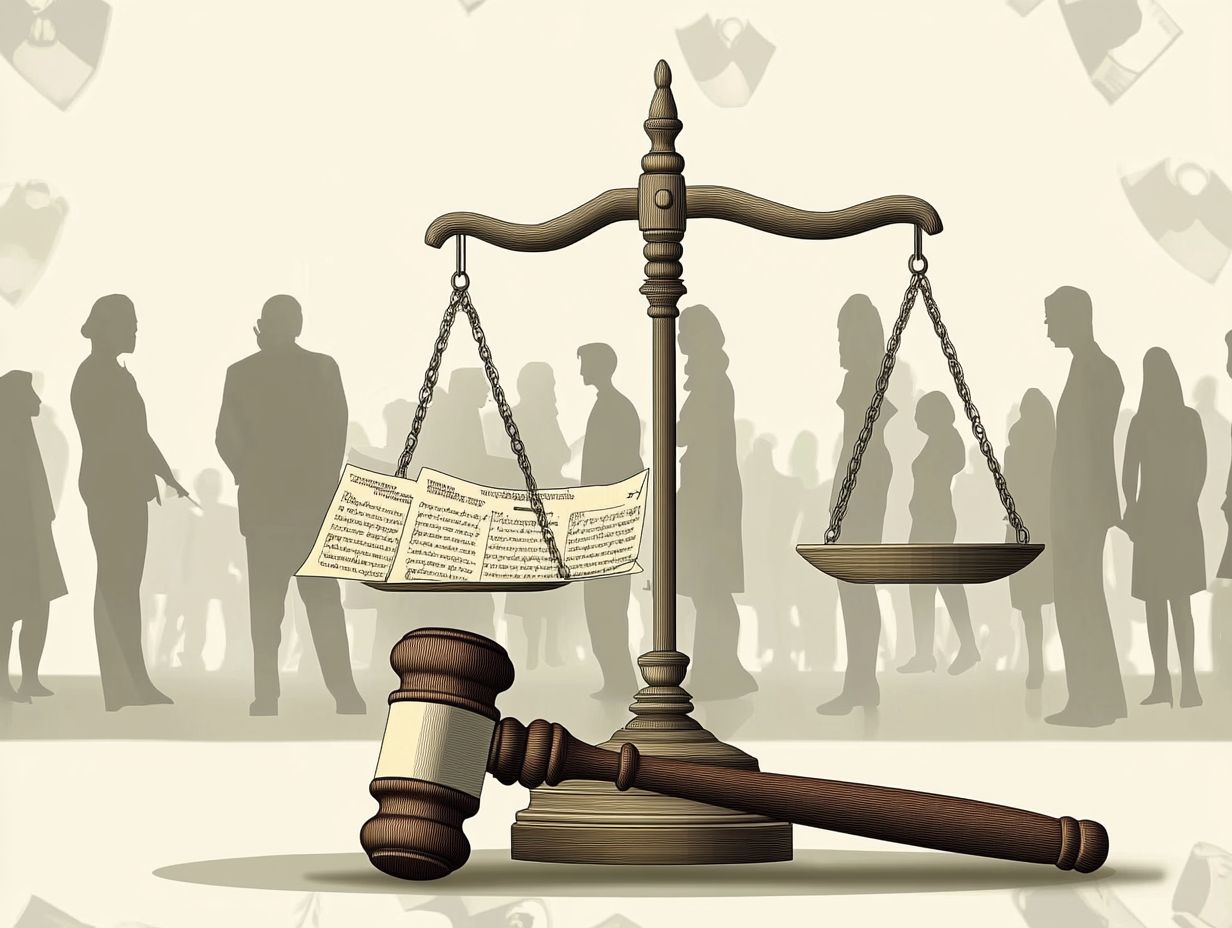
Here are some common questions about the rights of the accused.
What are the rights of the accused?
The rights of the accused are a set of legal protections granted to a person charged with a crime. These rights ensure that the accused is treated fairly and given a fair trial.
Who has the right to a fair trial?
Every person accused of a crime has the right to a fair trial, regardless of their race, gender, religion, or any other characteristics. This right is protected by the Constitution and is guaranteed to all individuals in the legal system.
What is the right to remain silent?
The right to remain silent lets the accused refuse to answer questions. This is known as the privilege against self-incrimination.
Can an accused person have a lawyer?
Yes, every accused person can have a lawyer in court. If they cannot afford one, the state will provide a lawyer.
What is the right to a speedy trial?
The right to a speedy trial means the accused must have a trial within a reasonable time frame. This prevents them from being held in jail too long.
What happens if the accused’s rights are violated?
If an accused person’s rights are violated, they can file a motion to dismiss the charges. They might also receive compensation for the violation.

